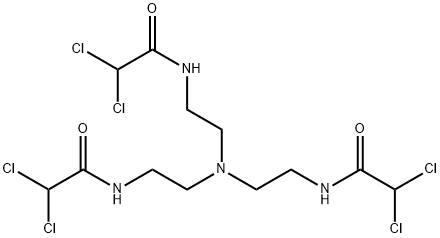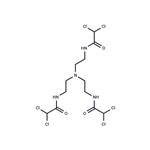Dichloroacetate (DCA) is an inhibitor of all pyruvate dehydrogenase kinase (PDHK) isoforms, which are enzymes that phosphorylate and inhibit PDH in mitochondria.
1,2 Inhibition of PDHK shifts cell metabolism from glycolysis to mitochondrial glucose oxidation, an effect that has relevance to cancer, type 2 diabetes, and other diseases.
2,3 CAY10703 is a DCA trimer that is at least 10-fold more cytotoxic against leukemia cell lines than DCA.
4 It is approximately 3-fold less cytotoxic than DCA against peripheral blood mononuclear cells from healthy blood donors. CAY10703 significantly reduces both basal and maximal respiration in leukemia cells.
4 It is stable
in vivo after subcutaneous inoculation, remaining in circulation for more than five hours after injection.
4
1. Whitehouse, S., Cooper, R.H., and Randle, P.J. Mechanism of activation of pyruvate dehydrogenase by dichloroacetate and other halogenated carboxylic acids Biochem. J. 141(3),761-774(1974).
2. Rodrigues, A.S., Correia, M., Gomes, A., et al. Dichloroacetate, the pyruvate dehydrogenase complex and the modulation of mESC pluripotency PLoS One 10(7),July 2015(2015).
3. Ruggieri, V., Agriesti, F., Scrima, R., et al. Dichloroacetate, a selective mitochondria-targeting drug for oral squamous cell carcinoma: A metabolic perspective of treatment Oncotarget 6(2),1217-1230(2015).
4. Trapella, C., Voltan, R., Melloni, E., et al. Design, synthesis, and biological characterization of novel mitochondria targeted dichloroacetate-loaded compounds with antileukemic activity J. Med. Chem. 59(1),147-156(2016).

